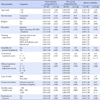Abstract
Purpose
This study was conducted to identify the influence of nurse manager and peer group caring behaviors as perceived by nurses on intention to retention.
Methods
The participants for this study were 229 nurses who had worked for over 6 months in general hospitals located in J province. Survey data were analyzed descriptive statistics and t-tests, ANOVAs with Scheffé's post-hoc testing, Pearson's correlation coefficients, and hierarchical regression analysis.
Results
The scores for ‘manager and peer group caring behaviors’ and intention to retention were all at a moderate level, although the subjects perceived ‘peer group caring behaviors’ as higher compared to ‘manager caring behaviors’. There were significant differences in ‘manager caring behaviors’ scores by suitability for present working department and employment status and in ‘peer group caring behaviors’ scores by suitability for present working department. The factors influencing nurses' intention to retention were religion, suitability for present department, clinical experience of over ten years, ‘manager caring behaviors’, and ‘peer group caring behaviors’
Figures and Tables
Table 3
Differences in Nurse Manager Caring Behaviors, Peer Group Caring Behaviors, and Intent to Retention by General Characteristics (N=229)

Table 4
Correlations among Nurse Manager Caring Behaviors, Peer Group Caring Behaviors, and Intent to Retention (N=229)

Table 5
Hierarchical Regression Analysis for Factors Affecting Intent to Retention (N=229)

*Dummy variables; Age (≤29=0, >29=1), Religion (yes=0, no=1), Marital status (unmarried=0, married=1), Suitability for present department (yes=0, no=1); TCE=Total clinical experience (<3=0), TCE 1=3~<5=1), TCE 2= (5~<10=1), TCE 3 (≥10=1); MS=Monthly salary (<200=0), MS 1= (200~<250=1), MS 2= (≥250=1).
References
1. Watson J. Nursing: human science and human care: A theory of nursing. Norwalk, Conn.: Appleton-Century-Crofts;1985.
2. Boykin A, Schoenhofer SO. Nursing as caring: A model for transforming practice. London: NLN Press;2013.
3. Godkin J, Godkin L. Caring behaviors among nurses: Fostering a conversation of gestures. Health Care Manage Rev. 2004; 29(3):258–267.
4. Longo J. Acts of caring: Nurses caring for nurses. Holist Nurs Pract. 2011; 25(1):8–16. DOI: 10.1097/HNP.0b013e3181fe2627.
5. Turkel MC. A journey into caring as experienced by nurse managers. Int J Hum Caring. 2003; 7(1):20–26.
6. Park E, Kim JH. The Experiences of Workplace Violence toward Nurses in Hospitals in Jeju Province, South Korea. Korean J Occup Health Nurs. 2011; 20(2):212–220. DOI: 10.5807/kjohn.2011.20.2.212.
7. O'Connell B, Young J, Brooks J, Hutchings J, Lofthouse J. Nurses' perceptions of the nature and frequency of aggression in general ward settings and high dependency areas. J Clin Nurs. 2000; 9(4):602–610. DOI: 10.1046/j.1365-2702.2000.00401.x.
8. Korean Hospital Nurses Association. Status of hospital nurse staffing on 2014. Seoul: Korean Hospital Nurses Association;2014.
9. Statistics Korea. Industrial workforce survey: Annual employment statistics [Internet]. Daejeon: Statistics Korea;2017. cited 2017 March 23. Available from: http://kosis.kr/statHtml/statHtml.do?orgId=118&tblId=DT_118N_MONA31&vw_cd=MT_ZTITLE&list_id=118_ATITLE_1_118_ATITLE_13_P45&seqNo=&lang_mode=ko&language=kor&obj_var_id=&itm_id=&conn_path=E1#.
10. Kim MJ. The effect of nursing organizational culture on nurses' intention of retention [master's thesis]. Seoul: Hanyang University;2006.
11. Hayes LJ, O'Brien-Pallas L, Duffield C, Shamian J, Buchan J, Hughes F, et al. Nurse turnover: A literature review. Int J Nurs Stud. 2006; 43(2):237–263. DOI: 10.1016/j.ijnurstu.2011.10.001.
12. Ko HJ, Kim JH. Relationships among Nursing work environment, job embeddedness, and turnover intention in nurses. J Korean Acad Nurs Adm. 2016; 22(3):279–291. DOI: 10.11111/jkana.2016.22.3.279.
13. Lee EH, Cho KS, Son HM. A study of hospital nurses' intention to keep nursing job. J Korean Clin Nurs Res. 2014; 20(1):15–27.
14. Longo J. The relationships between manager and peer caring to registered nurses' job satisfaction and intent to stay. Int J Hum Caring. 2009; 13(2):27–34.
15. Cowin LS. The effects of nurses's job satisfaction on retention: An Australian perspective. J Nurs Adm. 2002; 32(5):283–291.
16. AbuAlRub RF. Job stress, job performance and social support among hospital nurses. J Nurs Scholarsh. 2004; 36(1):73–78. DOI: 10.1111/j.1547-5069.2004.04016.x.
17. Hayhurst A, Saylor C, Stuenkel D. Work environmental factors and retention of nurses. J Nurs Care Qual. 2005; 20:283–288.
18. Park JO. The effect of advanced beginner-stage nurses' sense of calling, job satisfaction and organizational commitment on retention intention [master's thesis]. Busan: Kosin University;2015.
19. Lee MS. Practice of ethics counseling in elementary school. J Ethics Educ Stud. 2014; 35:1–25.
20. Park BC. The method of applicating care ethics to elementary moral education in Korea. J Moral Ethics Educ. 2005; 20:241–264.
21. Kong BH. Art of caring in nursing. Philos Med. 2007; 3:97–116.
22. Lee BS. Development of a measurement tool of caring to evaluate quality of nursing care. J Nurs Acad Soc. 1996; 26(3):653–667.
23. Kim JH, Kong MY, Oh YH. Validity and reliability of the peer group caring interaction scale-Korean Version. J Korean Acad Nurs. 2016; 46(3):431–442. DOI: 10.4040/jkan.2016.46.3.431.
24. Hughes LC. Development of an instrument to measure caring peer group interactions. J Nurs Educ. 1998; 37(5):202–207.
25. Kim MR. Clinical nurses' professionalism, nursing performance and intention of retention [master's thesis]. Seoul: Hanyang University;2008.
26. Kwon JA. Clinical nurses' working environment and intention on retention [master's thesis]. Seoul: Hanyang University;2009.
27. Jang SO. A study on the improvement of head nurse's leadership in general hospital nursing system [master's thesis]. Chungju: Chungbuk National University;2006.
28. Sohn IS, Han SS. Estimative factors and probability whether it is desire or no on the transfer of nurses' duty post. J Korean Acad Nurs Adm. 2003; 9(4):571–583.
29. Lee EH. The attitude toward division transfer, job stress, and nursing work performance depending on the division transfer experience of nurses [master's thesis]. Daegu: Kyungbook National University;2013.
30. Tourangeau AE, Cranley LA. Nurse intention to remain employed: understanding and strengthening determinants. J Adv Nurs. 2006; 55(4):497–509. DOI: 10.1111/j.1365-2648.2006.03934.x.




 PDF
PDF ePub
ePub Citation
Citation Print
Print




 XML Download
XML Download